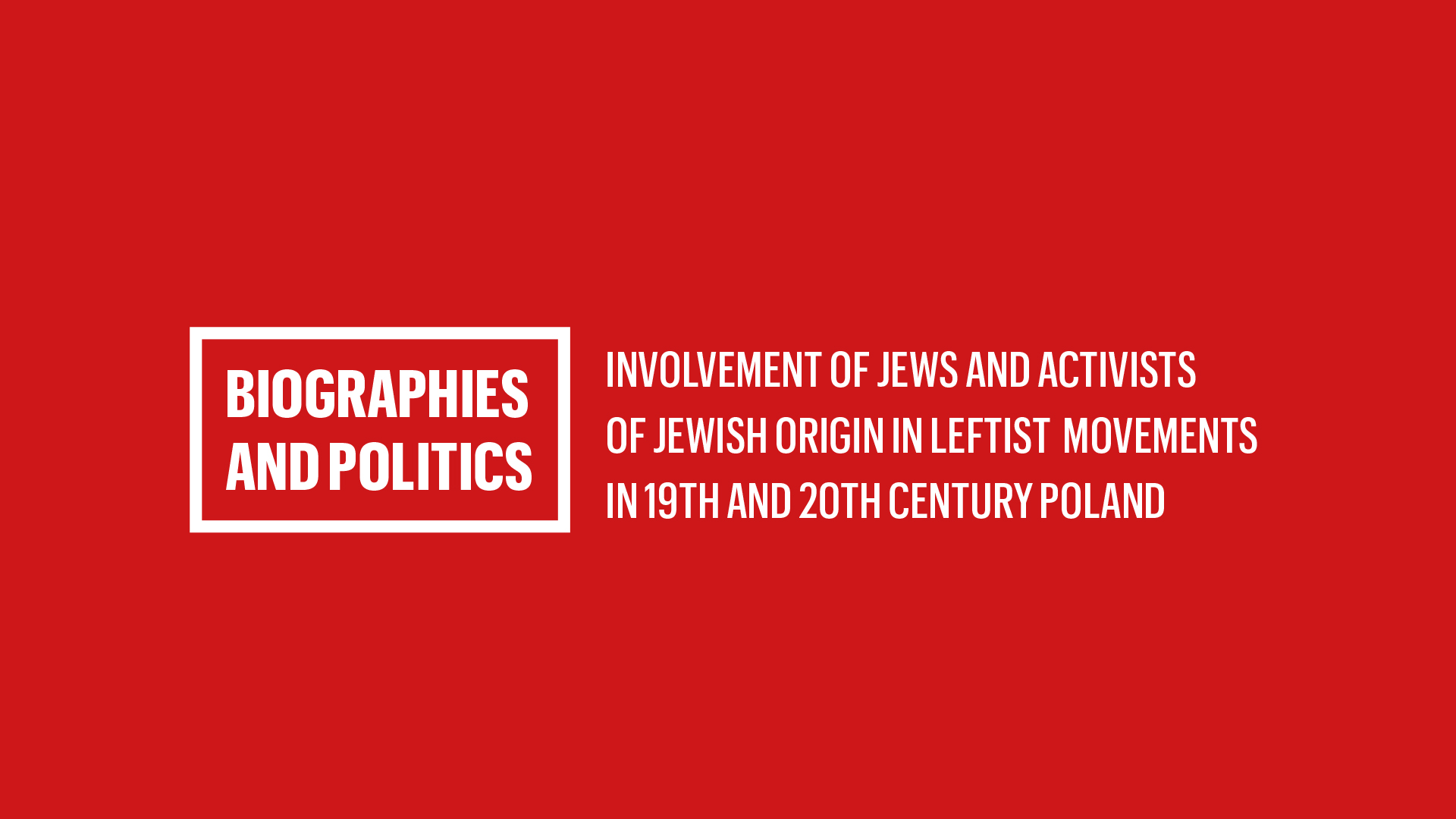Event
BIOGRAPHIES AND POLITICS: INVOLVEMENT OF JEWS AND ACTIVISTS OF JEWISH ORIGIN IN LEFTIST MOVEMENTS IN 19TH AND 20TH CENTURY POLAND
The involvement of the Jews of Poland in leftist political movements in 19th- and 20th-century Poland is a complex and challenging topic. Bundism or Labor Zionism openly combined Jewishness with leftist ideology. The situation is more complicated with actors of Jewish background in non-Jewish organizations, who at least partly did not consider themselves to be Jewish but were regarded as such by others. On another level, we cannot speak unequivocally about “Polish Jews” or “Poland” in the imperial era of the long nineteenth century, as other affiliations were also possible.

Nevertheless, the presence of Jews or actors of Jewish descent in these movements (social democrats, communist, leftist Zionists etc.), especially the prominent position some “Jews” held in the revolutionary movement and state socialism, has been an issue of public debate ever since. On the one hand, the myth of communist Jews as “Jewish perpetrators” was often and still is used to stir up anticommunist or nationalist sentiments. On the other hand, especially in western historiography the dominant narrative on the role of “Jewish” actors in leftist movements is one of an often disappointed struggle for political and social equality. It focusses on the failure of Jewish revolutionaries and Jewish communists as victims of Stalinism and communist regimes in East and East Central Europe. The persistence of these contrasting views deserves a thorough discussion and deeper academic reflection.
In our conference we will reach beyond such schematic conceptions. Instead we want to outline the actual involvement of Jews and activists of Jewish origin in the leftist movements of the 19th and 20th centuries from the perspective of individual motivations, ideological choices and personal biographies. To explore the different paths which led Jewish individuals to engage in leftist parties and organizations, we suggest approaching the topic from a biographical perspective. We thus invite scholars to present their findings on the formation of Jewish political identities based on biographical sources, especially ego-documents like diaries, personal letters, memoirs or oral testimonies.
Possible questions to be addressed might be:
- Was being Jewish an important factor in choosing a specific political path?
- Which other factors led Jews and people of Jewish origin to affiliate with a particular political group?
- How did their leftist involvement influence their attitude towards imperial settings, occupying powers, internationalist movements, as well as Poland and Polish identity?
- How did they assess their leftist engagement later in their lives?
Answers to these and other questions will shed new light on the character of Polish Jews’ involvement with the left.
Proposed issues:
1. Biographies: individual and collective paths of Jewish leftists, circumstances of social and political involvement in leftist movements and organizations, self-perceptions, alternatives to leftist engagement, entangled ideologies (e.g. leftists Zionists), generational transmission of ideologies;
2. Methodologies: biographical approach, gender history, oral history, and others;
3. Ideologies: attractive leftists ideas for Polish Jews (socialism, communism, labor Zionism etc.);
4. Historical culture and politics of history: Perceptions and instrumentalizations of “Jewish” leftist biographies
We invite you to submit your proposals.
For additional questions please contact us at: geopconference@polin.pl
The deadline for submitting the proposals is 31 May 2019.
Academic Committee:
Dr François Guesnet, UCL
Prof. Yvonne Kleinmann, Aleksander Brückner Zentrum
Dr. Agnieszka Mrozik, PAN
Prof. Joanna Nalewajko-Kulikov, PAN
Prof. Antony Polonsky, POLIN Museum
Prof. David Rechter, Oxford University
Dr. Stephan Stach, POLIN Museum (conference convener)
Dr. Michał Trębacz, POLIN Museum

Information
See also
Piętno Zagłady: Wojenna i powojenna historia oraz pamięć żydowskich dzieci ocalałych w Polsce by Joanna Beaty Michlic
Prof. Michael Fleming and dr Wojciech Rappak invite on 8th December 2021 at 6.15 PM GMT, as part of the seminar in cycle “Twentieth Century Polish History”, a book launch by Joanna Beata Michlic
Cultural dissent in Central and Eastern Europe
The spring online lecture series of the Forum in Literary Studies at the Institute of Czech Literature of the CAS will offer insight into current research topics of cultural dissent before 1989 in Central and Eastern Europe, especially issues of gender, alternative culture, mediality, transnationality and leftist thinking.
'Cat in the Wet Grass' by Kornel Filipowicz – between reading and translation
You are cordially invited to the fourth meeting in the series 'Reading Filipowicz'. This time we will enter into the fascinating world of Filipowicz's works in conversation with Anna Zaranko, who translates Filipowicz's works into English.
The Holocaust in 21st-Century Children’s, Young Adult and Adult Literature. New Comparative Perspectives
The CoHLit-21 research consortium is pleased to announce the international conference "The Holocaust in 21st-Century Children’s, Young Adult and Adult Literature: New Comparative Perspectives". Hosted by the Institute of Jewish Studies at the University of Antwerp and organized with additional support from Stichting Auschwitz/Fondation Auschwitz and the Department of Literary Studies at KU Leuven, the conference will take place from 27 to 29 June, 2023 in the city of Antwerp, Belgium.